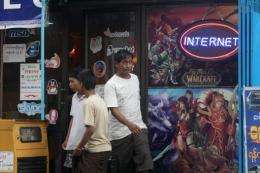Myanmar's cyber generation boots up for first-time vote

One of Myanmar's self-described "pioneer bloggers" proudly opens his popular website -- officially banned by the military rulers -- and scrolls to his updates on the approaching election.
Tin San has been carefully researching the candidates running in Myanmar's first polls in two decades, and for his next post he is busy reading up on the electoral regulations.
"Most people in Myanmar are not familiar with voting. We need to have resources and information to vote how we like," says the 30-year-old. Like all those in the country aged under 38, he has never voted before.
The November 7 election has been widely criticised by activists and the West as a sham orchestrated by the ruling generals to shore up their rule. Some favour a boycott by voters, many of whom are disillusioned with the process.
But Tin San, whose name AFP has changed for his protection, is among a group of optimists who advocate participation and online debate of the polls, despite some of the world's most repressive Internet controls.
"I have quite a lot of influence on my readers so I want them just to think about the information," he says.
"As far as I know, most young people are not interested in the election, even though they want change. But this is the beginning of change -- it's a stepping stone."
Judging by the busy cyber cafes across the main city Yangon, the web offers a way to tap the city's youth, despite slow connections, frequent power cuts and huge risks over online activity that the regime deems subversive.
Google users look up South Korean celebrities -- in line with the current Asia-wide craze -- while other cafe-goers read world news stories on the BBC website. Several are chattering on Google Talk or browsing Facebook.
Staff are quick to help clients find proxy servers to bypass blocks on certain websites, even though they are strictly forbidden to do so on threat of closure, according to media watchdog Reporters Without Borders.
The rights group describes Myanmar's legislation on Internet use, the Electronic Act, as "one of the most liberticidal laws in the world", with dissident netizens facing lengthy prison terms.
Tin San, who has about 2,000 Facebook friends and thousands more blog followers, says he holds informal gatherings across Yangon to discuss the Internet's uses -- and how to dodge the junta's restrictions.
"Political websites are banned but you can still read them, for example through (web aggregator) Google Reader," is one of his tips. He also offers advice about privacy settings on social networking sites.
During the "Saffron Revolution" monk-led protests in 2007, Myanmar's citizens used the web to leak extensive accounts and video to the outside world, sparking a total Internet ban by the iron-fisted regime.
Connections have also been slowed down on politically significant dates such as August 8, the anniversary of a mass political uprising in 1988.
"I think the government is quite afraid of blogs and bloggers," says Tin San, one of nearly 1,500 members of the online Myanmar Blogger Society.
Controls are expected to be tightened again during the election, but for now many are fearlessly talking politics online while they still can.
"I receive 10 to 20 emails from my friends each day about the things the government does in Myanmar," says 28-year-old Win Oo, who lives in Yangon and whose name has also been changed.
He says a friend recently sent him a cartoon of the junta chief Than Shwe looking like a clown. Prominent blogger Nay Phone Latt was jailed in 2008 for 20 years, later reduced to 12, for allegedly storing such an image on email, among other offences.
"If I want to look at things like that, I sit in the corner of the Internet cafe, not in the middle, because we never know about the other users or the owner," says Win Oo, who also intends to vote this year.
For those who can dodge the firewalls and take the risks, the Internet offers more freedom to discuss the election than print journals, which face rigid censorship over their reports.
Yet few political parties have taken their campaign online. Two that have attempted it -- the Myanmar Democracy Congress party and the Peace and Diversity Party -- have had their websites banned.
Even if their sites were allowed, the web's reach outside the major cities of Yangon and Mandalay is severely limited.
Just one in every 455 of Myanmar's inhabitants were Internet users in 2009, based on statistics from the International Telecommunication Union, a UN agency in Geneva.
About two thirds of the population, estimated at about 50 million, live in the countryside and have limited access to information about the election, the main parties and the issues at stake.
"It's quite ok for urban youths who have Internet access but what about youths in rural areas, small town people and farmers? How do we help them?" asks a business editor in Yangon.
Web-savvy city dwellers still hope their online activity, however restricted, will help to spread political awareness across the country.
"The Internet can help to change the outcome of an election, maybe not this one but the next," says a 26-year-old student of Yangon-based civil society group Myanmar Egress, which has promoted participation in the polls.
"We are already in a transition period so we have to concentrate on sharing things, updating news, doing more," he says. "We can eat the fruit in 10 years -- it will not happen immediately".
(c) 2010 AFP




















